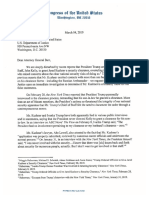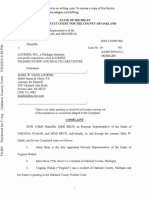3
corruption institutions that would help ensure that no Ukrainians, however powerful, were above the law. Despite this resistance, the Ambassador and the Embassy kept pushing anti-corruption and the other priorities of our policy toward Ukraine.
IV.
Emergence of a Political Agenda
Beginning in March 2019, the situation at the Embassy and in Ukraine changed dramatically. Specifically, the three priorities of security, economy, and justice, and our support for Ukrainian democratic resistance to Russian aggression, became overshadowed by a political agenda being promoted by former New York City Mayor Rudy Giuliani and a cadre of officials operating with a direct channel to the White House. That change began with the emergence of press reports critical of Ambassador Yovanovitch and machinations by then-Prosecutor General Lutsenko and others to discredit her. In mid-March 2019, an Embassy colleague learned from a Ukrainian contact that Mr. Lutsenko had complained that Ambassador
Yovanovitch had “destroyed
him
”
with her refusal to support him until he followed through with his reform commitments and ceased using his position for personal gain. In retaliation, Mr. Lutsenko made a series of unsupported allegations against Ambassador Yovanovitch, mostly suggesting that Ambassador Yovanovitch improperly used the Embassy to advance the political interests of the Democratic party.
Among Mr. Lutsenko’s allegations were
that the Embassy had ordered the investigation of a former Ukrainian official solely because that former official was allegedly the main Ukrainian contact of the Republican Party and of President Trump personally, and that the Embassy had allegedly pressured
Lutsenko’s
predecessor to close a case against a different former Ukrainian official, solely because of an alleged connection between that
official’s
company, Burisma, and former Vice President
Biden’s son.
Mr. Lutsenko also claimed that he had never received $4.4 million in U.S. funds intended for his office, and that there was a tape of a Ukrainian official saying he was trying to help Hillary Clinton win the 2016 election. Finally, Mr. Lutsenko publically claimed that Ambassador Yovanovitch had given
him a “do not
prosecute list
”
containing the names of her supposed allies, an allegation that the State Department called an
“
outright
fabrication,” and
that Mr. Lutsenko later retracted. Mr. Lutsenko said that, as a result of these allegations, Ambassador Yovanovitch would face
“serious problems” in the United States.
Public opinion polls in Ukraine indicated that Ukrainians generally did not believe Mr.
Lutsenko’s allegations, and on March 22, President
Poroshenko issued a statement in support of Ambassador Yovanovitch. Following
Mr. Lutsenko’s allegations, Mr. Giuliani and others made a number of public
statements critical of Ambassador Yovanovitch, questioning her integrity and calling for her removal from office. Mr. Giuliani was also making frequent public statements pushing for Ukraine to investigate interference in the 2016 election and issues related to Burisma and the Bidens. For example, on May 1, 2019, the New York Times reported that Mr. Giuliani had
“discussed the Burisma investigation, and its intersections with the Bidens, with the ousted
Ukrainian prosecutor genera
l and the current prosecutor.”
On May 9, the New York Times reported that Mr. Giuliani said he planned to travel to Ukraine to pursue investigations into
2016 election interference and into the involvement of former Vice President Biden’s s
on in a
 Jen Hayden
Jen Hayden Jen Hayden
Jen Hayden Karoli
Karoli  Jen Hayden
Jen Hayden Jen Hayden
Jen Hayden Jen Hayden
Jen Hayden Jen Hayden
Jen Hayden Jen Hayden
Jen Hayden Jen Hayden
Jen Hayden







